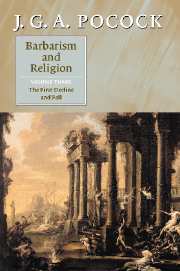Book contents
- Frontmatter
- Contents
- Acknowledgements
- Note on usages
- List of abbreviations
- Introduction
- PROLOGUE
- 1 Gibbon's first volume: the problem of the Antonine moment
- PART I THE FIRST DECLINE AND FALL: ANCIENT PERCEPTIONS
- PART II THE AMBIVALENCE AND SURVIVAL OF CHRISTIAN EMPIRE
- PART III THE HUMANIST CONSTRUCTION OF DECLINE AND FALL
- 8 Leonardo Bruni: from translatio to declinatio
- 9 Flavio Biondo and the decades of decline
- 10 Niccolo Machiavelli and the imperial republic
- PART IV EXTENSIVE MONARCHY AND ROMAN HISTORY
- PART V REPUBLIC AND EMPIRE: THE ENLIGHTENED NARRATIVE
- PART VI GIBBON AND THE STRUCTURE OF DECLINE
- EPILOGUE
- Bibliography of works cited
- Index
8 - Leonardo Bruni: from translatio to declinatio
Published online by Cambridge University Press: 15 December 2009
- Frontmatter
- Contents
- Acknowledgements
- Note on usages
- List of abbreviations
- Introduction
- PROLOGUE
- 1 Gibbon's first volume: the problem of the Antonine moment
- PART I THE FIRST DECLINE AND FALL: ANCIENT PERCEPTIONS
- PART II THE AMBIVALENCE AND SURVIVAL OF CHRISTIAN EMPIRE
- PART III THE HUMANIST CONSTRUCTION OF DECLINE AND FALL
- 8 Leonardo Bruni: from translatio to declinatio
- 9 Flavio Biondo and the decades of decline
- 10 Niccolo Machiavelli and the imperial republic
- PART IV EXTENSIVE MONARCHY AND ROMAN HISTORY
- PART V REPUBLIC AND EMPIRE: THE ENLIGHTENED NARRATIVE
- PART VI GIBBON AND THE STRUCTURE OF DECLINE
- EPILOGUE
- Bibliography of works cited
- Index
Summary
Rather more than forty-five years ago, the late Hans Baron began publishing the series of studies of which the centrepiece is entitled The Crisis of the Early Italian Renaissance: Civic Humanism and Republican Liberty in an Age of Classicism and Tyranny. He presented a complex thesis which it is necessary to summarise. Focusing on the writings of Florentine authors from Coluccio Salutati and Leonardo Bruni in the first half of the fifteenth century to Niccolò Machiavelli and Francesco Guicciardini in the first half of the sixteenth, Baron posited a ‘crisis of liberty’ occasioned by the war of 1400–02, in which Florence had confronted the danger that Giangaleazzo Visconti, the lord of Milan, was about to establish a hegemony over all the city republics of north and central Italy. This had produced a sudden and intense awareness of the values of liberty, specifically that liberty enjoyed by citizens in the government of their republic and themselves, as described by Athenian authors including Aristotle and Roman authors including Livy; and because the humanist rediscovery of Greek and Roman texts included so many in which eleutheria, autonomia and libertas in this sense were presented as among the highest values, Baron felt justified in describing as ‘civic humanism’ an ideology valuing classical antiquity in which the good life for man was held to be that of the citizen in a republic.
- Type
- Chapter
- Information
- Barbarism and Religion , pp. 153 - 178Publisher: Cambridge University PressPrint publication year: 2003
- 1
- Cited by

